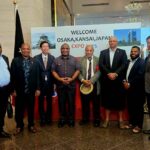Prime Minister Hon. James Marape today proudly announced a major breakthrough in Papua New Guinea’s health care history as Port Moresby General Hospital (PMGH) successfully performed the country’s first-ever kidney transplant.
This groundbreaking procedure, which took place this afternoon following the National Executive Council’s approval of the National Surgical, Obstetric and Anaesthetic Policy (NSO&A Policy) 2025–2030, positions Papua New Guinea as the first Pacific Island nation to successfully undertake an organ transplant, reaffirming the Marape Government’s unwavering commitment to delivering world-class, specialist health services domestically.
“This is a monumental achievement for our country. It is proof that our vision of providing complex, life-saving health care within our borders is becoming a reality,” said Prime Minister Marape. “Our people should no longer have to struggle to raise enormous funds to seek medical attention overseas. We are building capacity right here in PNG so that all citizens have access to advanced and affordable health care.”
Two live-donor transplant surgeries were scheduled today, with the first commencing at 1pm after the NSO&A Policy was formally approved by Cabinet. The surgeries were conducted under the supervision of the UK-based Transplant Links Community (TLC), whose team is working closely with local specialists to ensure all procedures meet the highest ethical and clinical standards.
A Vision Realised for PNG Health Care Transformation
The successful kidney transplant is a direct result of the Government’s health transformation agenda, as outlined in the National Health Plan 2021–2030 and further consolidated in the Medium-Term Development Plan IV, focusing on improving access to critical and specialist health care services across PNG.
In his inaugural speech following the 2022 General Elections, Prime Minister Marape made a bold commitment that by 2025, no Papua New Guinean would need to go overseas for advanced medical treatment. Today’s milestone is testament to that pledge.
PMGH, now designated as PNG’s Level 6 National Tertiary Referral and Teaching Hospital, is at the forefront of this transformation. It is being positioned as the nation’s Centre of Excellence for specialist care, postgraduate training, and research, with the support of the Government, National Fisheries Authority, State-owned entities, and international partners.
Responding to the Growing Burden of Chronic Kidney Disease
Chronic Kidney Disease (CKD) is a growing national crisis, driven by rising rates of diabetes and hypertension, with over 40 patients currently undergoing dialysis at the PNG Kidney Foundation’s unit in Port Moresby and new cases increasing weekly.
Dialysis costs between K10,000 and K30,000 per year, with many families forced to relocate closer to treatment centres, placing an immense financial and social burden on them. In the last five years alone, 21 Papua New Guineans underwent kidney transplants overseas, costing the nation an estimated K10–13 million, with each procedure costing up to K600,000.
“A kidney transplant is the most effective and cost-saving solution,” Prime Minister Marape said. “It not only offers a new lease on life for patients but also ensures they can return to a normal, productive life—free from the heavy costs and burden of dialysis.”
Economic and Regional Impact
Prime Minister Marape highlighted the significant economic benefits of developing national kidney transplant services, including:
• Reducing the need for costly overseas treatments, keeping valuable kina within the country.
• Enabling patients to remain economically active, contributing to national productivity.
• Laying the foundation for medical tourism, positioning PNG as a regional hub for kidney transplant services in the Pacific.
• Strengthening PMGH’s role as a regional training and research centre for kidney transplants, supported by partners from the UK, Taiwan, Malaysia, and the Philippines.
A Comprehensive Health Future
The first kidney transplant is part of PMGH’s broader mission to deliver comprehensive heart, cancer, and kidney services by 2025, aligning with the Marape Government’s health sector vision.
The Kumul Petroleum National Heart Centre, the National Cancer Centre, and now the Kidney Transplant Centre, represent pillars of this new era of health care delivery, bringing hope, dignity, and world-class services to the doorsteps of Papua New Guineans.
Prime Minister Marape concluded, “Today’s historic kidney transplant is not just a medical success—it is a reaffirmation of our government’s commitment to transform our health system into one that is equitable, accessible, and world-class. Together, we are writing a new chapter in the health story of our nation.”






